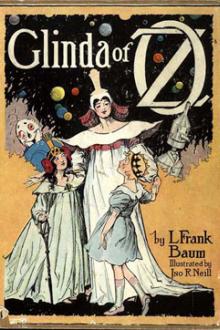The Emerald City of Oz, L. Frank Baum [i am malala young readers edition .txt] 📗

- Author: L. Frank Baum
Book online «The Emerald City of Oz, L. Frank Baum [i am malala young readers edition .txt] 📗». Author L. Frank Baum
"It's a great invention, I'm sure," said Dorothy, looking admiringly at the Wizard, who blushed modestly at this praise.
"We live in an age of progress," announced Professor Wogglebug, pompously. "It is easier to swallow knowledge than to acquire it laboriously from books. Is it not so, my friends?"
"Some folks can swallow anything," said Aunt Em, "but to me this seems too much like taking medicine."
"Young men in college always have to take their medicine, one way or another," observed the Wizard, with a smile; "and, as our Professor says, these School Pills have proved to be a great success. One day while I was making them I happened to drop one of them, and one of Billina's chickens gobbled it up. A few minutes afterward this chick got upon a roost and recited 'The Boy Stood on the Burning Deck' without making a single mistake. Then it recited 'The Charge of the Light Brigade' and afterwards 'Excelsior.' You see, the chicken had eaten an Elocution Pill."
They now bade good-bye to the Professor, and thanking him for his kind reception mounted again into the red wagon and continued their journey.
10. How the Cuttenclips Lived
The travelers had taken no provisions with them because they knew that they would be welcomed wherever they might go in the Land of Oz, and that the people would feed and lodge them with genuine hospitality. So about noon they stopped at a farm-house and were given a delicious luncheon of bread and milk, fruits and wheat cakes with maple syrup. After resting a while and strolling through the orchards with their host--a round, jolly farmer--they got into the wagon and again started the Sawhorse along the pretty, winding road.
There were signposts at all the corners, and finally they came to one which read:
TAKE THIS ROAD TO THE CUTTENCLIPS
There was also a hand pointing in the right direction, so they turned the Sawhorse that way and found it a very good road, but seemingly little traveled.
"I've never seen the Cuttenclips before," remarked Dorothy.
"Nor I," said the Captain General.
"Nor I," said the Wizard.
"Nor I," said Billina.
"I've hardly been out of the Emerald City since I arrived in this country," added the Shaggy Man.
"Why, none of us has been there, then," exclaimed the little girl. "I wonder what the Cuttenclips are like."
"We shall soon find out," said the Wizard, with a sly laugh. "I've heard they are rather flimsy things."
The farm-houses became fewer as they proceeded, and the path was at times so faint that the Sawhorse had hard work to keep in the road. The wagon began to jounce, too; so they were obliged to go slowly.
After a somewhat wearisome journey they came in sight of a high wall, painted blue with pink ornaments. This wall was circular, and seemed to enclose a large space. It was so high that only the tops of the trees could be seen above it.
The path led up to a small door in the wall, which was closed and latched. Upon the door was a sign in gold letters reading as follows:
VISITORS are requested to MOVE SLOWLY and CAREFULLY, and to avoid COUGHING or making any BREEZE or DRAUGHT.
"That's strange," said the Shaggy Man, reading the sign aloud. "Who ARE the Cuttenclips, anyhow?"
"Why, they're paper dolls," answered Dorothy. "Didn't you know that?"
"Paper dolls! Then let's go somewhere else," said Uncle Henry. "We're all too old to play with dolls, Dorothy."
"But these are different," declared the girl. "They're alive."
"Alive!" gasped Aunt Em, in amazement.
"Yes. Let's go in," said Dorothy.
So they all got out of the wagon, since the door in the wall was not big enough for them to drive the Sawhorse and wagon through it.
"You stay here, Toto!" commanded Dorothy, shaking her finger at the little dog. "You're so careless that you might make a breeze if I let you inside."
Toto wagged his tail as if disappointed at being left behind; but he made no effort to follow them. The Wizard unlatched the door, which opened outward, and they all looked eagerly inside.
Just before the entrance was drawn up a line of tiny soldiers, with uniforms brightly painted and paper guns upon their shoulders. They were exactly alike, from one end of the line to the other, and all were cut out of paper and joined together in the centers of their bodies.
As the visitors entered the enclosure the Wizard let the door swing back into place, and at once the line of soldiers tumbled over, fell flat upon their backs, and lay fluttering upon the ground.
"Hi there!" called one of them; "what do you mean by slamming the door and blowing us over?"
"I beg your pardon, I'm sure," said the Wizard, regretfully. "I didn't know you were so delicate."
"We're not delicate!" retorted another soldier, raising his head from the ground. "We are strong and healthy; but we can't stand draughts."
"May I help you up?" asked Dorothy.
"If you please," replied the end soldier. "But do it gently, little girl."
Dorothy carefully stood up the line of soldiers, who first dusted their painted clothes and then saluted the visitors with their paper muskets. From the end it was easy to see that the entire line had been cut out of paper, although from the front the soldiers looked rather solid and imposing.
"I've a letter of introduction from Princess Ozma to Miss Cuttenclip," announced Dorothy.
"Very well," said the end soldier, and blew upon a paper whistle that hung around his neck. At once a paper soldier in a Captain's uniform came out of a paper house near by and approached the group at the entrance. He was not very big, and he walked rather stiffly and uncertainly on his paper legs; but he had a pleasant face, with very red cheeks and very blue eyes, and he bowed so low to the strangers that Dorothy laughed, and the breeze from her mouth nearly blew the Captain over. He wavered and struggled and finally managed to remain upon his feet.
"Take care, Miss!" he said, warningly. "You're breaking the rules, you know, by laughing."
"Oh, I didn't know that," she replied.
"To laugh in this place is nearly as dangerous as to cough," said the Captain. "You'll have to breathe very quietly, I assure you."
"We'll try to," promised the girl. "May we see Miss Cuttenclip, please?"
"You may," promptly returned the Captain. "This is one of her reception days. Be good enough to follow me."
He turned and led the way up a path, and as they followed slowly, because the paper Captain did not move very swiftly, they took the opportunity to gaze around them at this strange paper country.
Beside the path were paper trees, all cut out very neatly and painted a brilliant green color. And back of the trees were rows of cardboard houses, painted in various colors but most of them having green blinds. Some were large and some small, and in the front yards were beds of paper flowers quite natural in appearance. Over some of the porches paper vines were twined, giving them a cozy and shady look.
As the visitors passed along the street a good many paper dolls came to the doors and windows of their houses to look at them curiously. These dolls were nearly all the same height, but were cut into various shapes, some being fat and some lean. The girl dolls wore many beautiful costumes of tissue paper, making them quite fluffy; but their heads and hands were no thicker than the paper of which they were made.
Some of the paper people were on the street, walking along or congregated in groups and talking together; but as soon as they saw the strangers they all fluttered into the houses as fast as they could go, so as to be out of danger.
"Excuse me if I go edgewise," remarked the Captain as they came to a slight hill. "I can get along faster that way and not flutter so much."
"That's all right," said Dorothy. "We don't mind how you go, I'm sure."
At one side of the street was a paper pump, and a paper boy was pumping paper water into a paper pail. The Yellow Hen happened to brush against this boy with her wing, and he flew into the air and fell into a paper tree, where he stuck until the Wizard gently pulled him out. At the same time, the pail went into the air, spilling the paper water, while the paper pump bent nearly double.
"Goodness me!" said the Hen. "If I should flop my wings I believe I'd knock over the whole village!"
"Then don't flop them--please don't!" entreated the Captain. "Miss Cuttenclip would be very much distressed if her village was spoiled."
"Oh, I'll be careful," promised Billina.
"Are not all these paper girls and women named Miss Cuttenclips?" inquired Omby Amby.
"No indeed," answered the Captain, who was walking better since he began to move edgewise. "There is but one Miss Cuttenclip, who is our Queen, because she made us all. These girls are Cuttenclips, to be sure, but their names are Emily and Polly and Sue and Betty and such things. Only the Queen is called Miss Cuttenclip."
"I must say that this place beats anything I ever heard of," observed Aunt Em. "I used to play with paper dolls myself, an' cut 'em out; but I never thought I'd ever see such things alive."
"I don't see as it's any more curious than hearing hens talk," returned Uncle Henry.
"You're likely to see many queer things in the Land of Oz, sir," said the Wizard. "But a fairy country is extremely interesting when you get used to being surprised."
"Here we are!" called the Captain, stopping before a cottage.
This house was made of wood, and was remarkably pretty in design. In the Emerald City it would have been considered a tiny dwelling, indeed; but in the midst of this paper village it seemed immense. Real flowers were in the garden and real trees grew beside it. Upon the front door was a sign reading:
MISS CUTTENCLIP.
Just as they reached the porch the front door opened and a little girl stood before them. She appeared to be about the same age as Dorothy, and smiling upon her visitors she said, sweetly:
"You are welcome."
All the party seemed relieved to find that here was a real girl, of flesh and blood. She was very dainty and pretty as she stood there welcoming them. Her hair was a golden blonde and her eyes turquoise blue. She had rosy cheeks and lovely white teeth. Over her simple white lawn dress she wore an apron with pink and white checks, and in one hand she held a pair of scissors.
"May we see Miss Cuttenclip, please?" asked Dorothy.
"I am Miss Cuttenclip," was the reply. "Won't you come in?"
She held the door open while they all entered a pretty sitting-room that was littered with all sorts of paper--some stiff, some thin, and some tissue. The sheets and scraps were of all colors. Upon a table were paints and brushes, while several pair of scissors, of different sizes, were lying about.
"Sit down, please," said Miss Cuttenclip, clearing the paper scraps off some of the chairs. "It is so long since I have had any visitors that I am not properly prepared to receive them. But I'm sure you will pardon my untidy room, for this is my workshop."
"Do you make all the paper dolls?" inquired Dorothy.
"Yes; I cut them out with my scissors, and paint the faces and some of the costumes. It is very pleasant work, and I am happy making my paper village grow."
"But how do the paper dolls happen to be alive?" asked Aunt Em.
"The first dolls I made were not alive," said Miss Cuttenclip. "I used to live near the castle of a great Sorceress named Glinda the Good, and she saw my dolls and said they were very pretty. I told her I thought I would like them better if they were alive, and the next day the Sorceress brought me a lot of magic paper. 'This is live paper,' she said, 'and all the dolls you cut out of it will be alive, and able to think and to talk. When you





Comments (0)